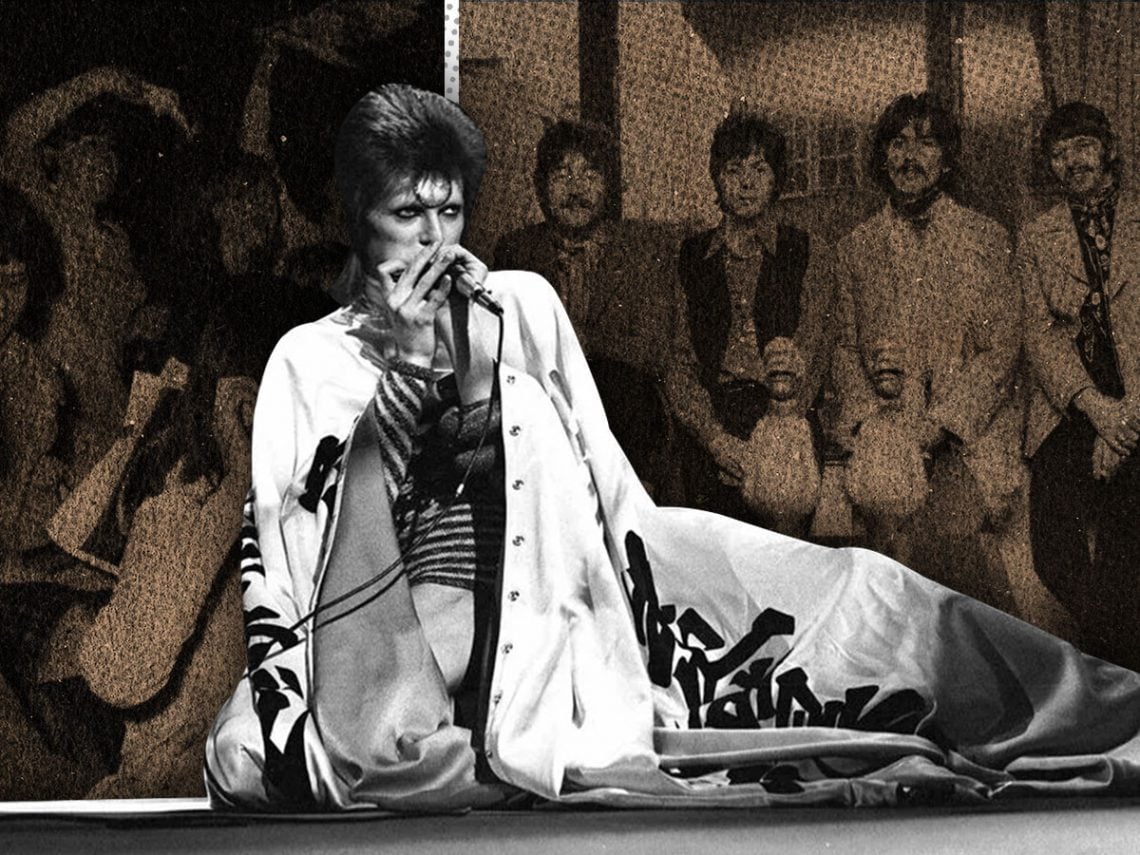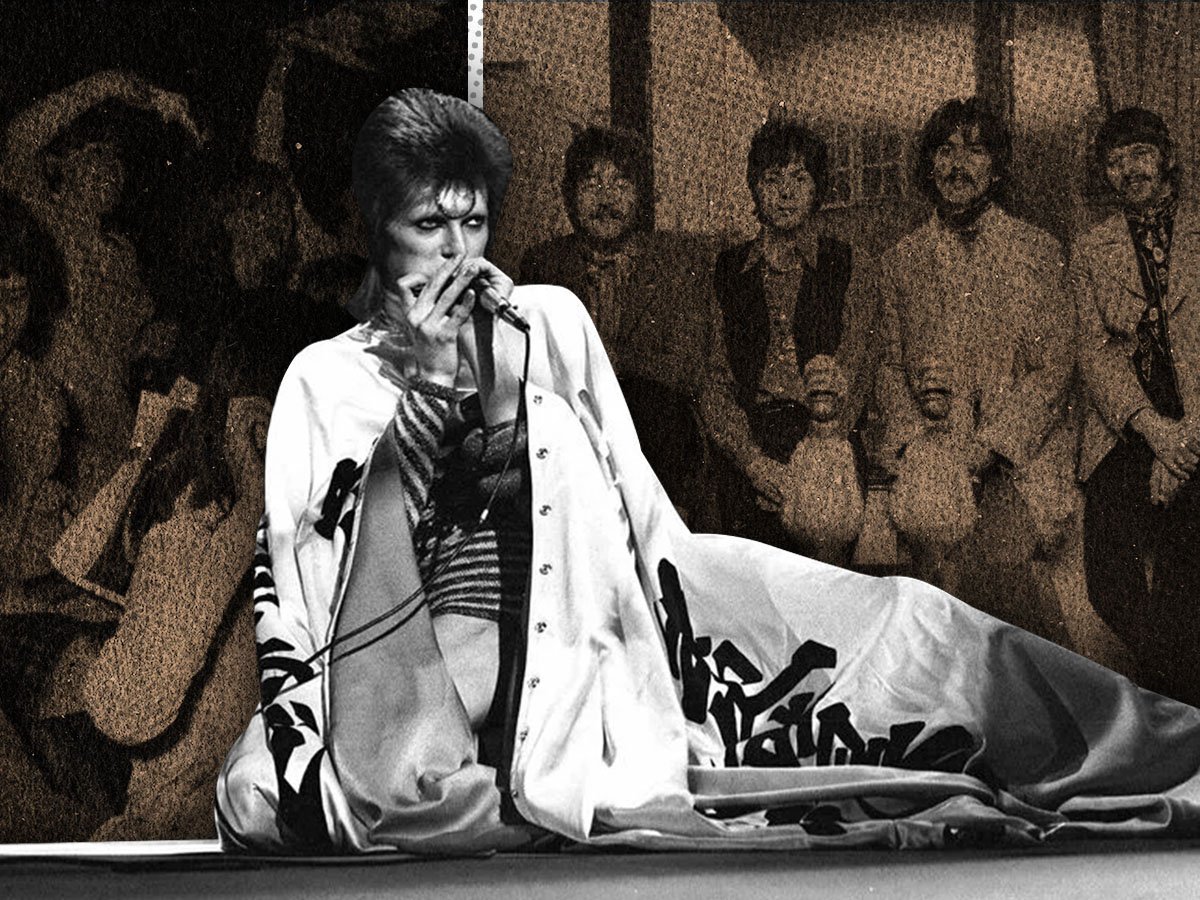
(Credits: Far Out / Alamy / Bent Rej)
Tue 3 June 2025 17:51, UK
Where would the world be without David Bowie and The Beatles? They are among the few artists who have proved so transcendent that it is impossible to fathom the state of music without their seismic influence. Thus, there is no finer thrill than seeing them collide in some way. This rousing live recording is just about the most adrenalising collision that you’ll ever come across—representing a rare moment in time where luminaries of the 1960s and ‘70s seemed to coexist.
The respect between the two artists was vast. “It’s impossible for me to talk about popular music without mentioning probably my greatest mentor, John Lennon,” Bowie once declared. “I guess he defined for me, at any rate, how one could twist and turn the fabric of pop and imbue it with elements from other art forms, often producing something extremely beautiful, very powerful and imbued with strangeness.”
The admiration was a two-way street. Remarkably, one fateful night in New York in 1974, Lennon and Paul McCartney paid a visit to the dinghy hotel where Bowie was holed up: “They actually asked me if I’d join the two of them and become a trio with them, and we’d change the name to something like David Bowie and The Beatles because they liked the idea of it being DBB.”
Sadly, however, the dawn brought about that eternal problem that HG Wells wrote about in Time Machine way back in 1895, proving that the death of drunken ideas in the morning sun is a universal constant. “It sounds plausible enough tonight,” he wrote, “but wait until tomorrow. Wait for the common sense of the morning.” As Bowie wearily concludes: “But, you know, the next morning it just never came to anything.”
So, this recording from 1972 is about as close as a peak collaboration between the two gets. It is taken from a time when Bowie was buried deep in his Ziggy Stardust persona and wowing audiences with his wavering sets. Shock and startle were two tenets central to his act, and he figured that throwing in a Beatles rarity would certainly satiate both of those thrills.
Thus, when he took to the stage at the Locarno in Bristol, his trick that evening was to roll out ‘This Boy’. The song, first released by The Beatles in November 1963 as the B-side of the band’s Parlophone single ‘I Want to Hold Your Hand’, was written by John Lennon in the style of Motown icon Smokey Robinson. Filled with harmonies and a seamless sense of melody, it was one of the few early tracks that George Harrison still retrospectively looked back on fondly.
The subtle complexity of the otherwise poppy piece was always going to be something that appealed to Bowie and his penchant for placing tricky jazz chords amid typical four-chord structures like the curveball master he always was. So, even though The Beatles’ original not be as angular as the otherworldly tracks he regaled on the Ziggy Stardust tour, like ‘Moonage Daydream’ and ‘Queen Bitch’, the rock ‘n’ roll star still found a way to make it work perfectly.
Clearly in the mood to celebrate some of his peers that evening, Bowie also covered two Velvet Underground songs with renditions of ‘I’m Waiting for the Man’ and ‘White Light/White Heat’ before ultimately finishing the set with a cover of Chuck Berry hit ‘Around and Around’.
However, it was his ‘This Boy’ choice that perhaps is the most telling when it comes to what he was trying to convey. Ziggy Stardust was created as a conduit to revivify youth culture. Since the death of The Beatles, he was concerned that the vigour of rock ‘n’ roll was being eroded by commercialism and industry strong-armning, so it deeply notable that his cover dates back to the very start of Beatlemania.
From this standpoint, his charismatic, quirky reinvention of the Fab Four is an inspirational look into the workings of Bowie both musically and the interplay of his art with pop culture history. Not only was he one of the foremost artists at the time, but he was desperately trying to carve himself into the Rushmore of rock with his gender-bending and genre-melding performances.
He wasn’t trying to do that for his own sake, but in a bid to prevent the slide of art. That’s palpable in the passionate way he delivers this doo-wop classic. Yet, like any true artist, Bowie is able to take these songs and make them feel like his, anyhow. Well, maybe more like he made them feel like Ziggy’s.
You can check out the audio for Bowie’s ‘This Boy’ below.
Related Topics
Subscribe To The Far Out Newsletter
